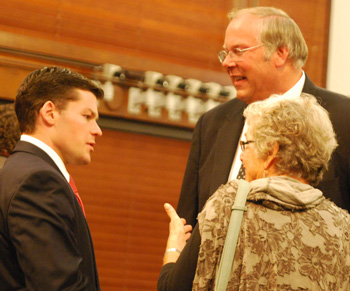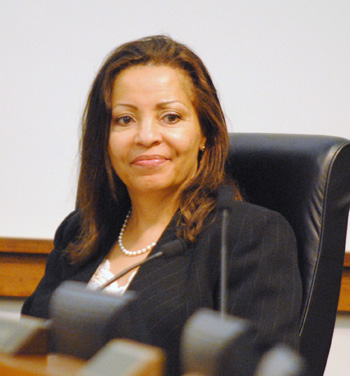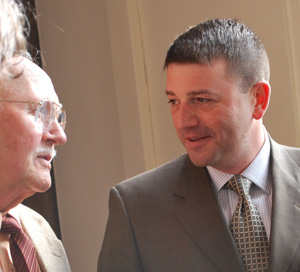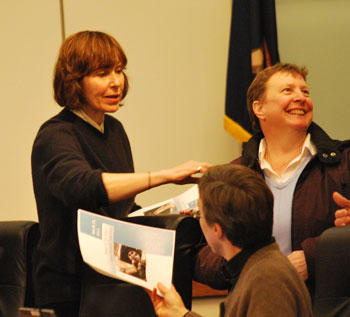Washtenaw County board of commissioners special meeting (Sept. 13, 2011): At a meeting called for the sole purpose of dealing with tentative labor deals, the county board approved new agreements with three unions representing county employees, including its largest employee union, AFSCME Local 2733.

Caryette Fenner, president of AFSCME Local 2733, the labor union representing the largest number of Washtenaw County government employees. (Photo by the writer.)
The deals affect 675 union employees, as well as 271 non-union, court non-union and elected officials – or nearly 70% of the county’s total 1,369 employees.
AFSCME Local 2733 represents about half of the county’s employees – 644 people. The Local 2733 agreement was ratified by a 2-to-1 vote earlier this week, but only 325 members voted. Caryette Fenner, president of Local 2733, described it as a typical turnout.
County administrator Verna McDaniel said these three agreements, coupled with those already approved, will yield $7.7 million in savings over 2012 and 2013. The county has a goal of gaining $8 million in labor concessions for that two-year period, to help overcome an estimated $17.5 million deficit.
McDaniel is expected to present a draft budget to the board at its Sept. 21 meeting.
There was no discussion before the board vote, which occurred after the board emerged from a 30-minute closed session to discuss labor negotiations. Commissioner Dan Smith (R-District 2) cast the lone vote against the agreements.
In a follow-up interview with The Chronicle, Smith cited concerns over health care provisions that would cost the county more than he had been led to expect, based on previous agreements already approved by the board for Michigan Nurses Association Units I and II.
And because of “me too” clauses in other union agreements, the more favorable terms negotiated by AFSCME Local 2733 will likely be applied to other union contracts as well.
In addition to the agreement with five bargaining units of AFSCME Local 2733, Tuesday’s approved agreements were with: (1) the two bargaining units of TPOAM (Technical, Professional and Officeworkers Association of Michigan); and (2) one of two bargaining units of AFSCME Local 3052. Also, the same benefits that AFSCME Local 2733 receives will be extended to the non-union, court non-union and elected officials.
The second bargaining unit of AFSCME Local 3052, representing 55 general supervisors, voted down its agreement this week. Nancy Heine, president of AFSCME Local 3052, told The Chronicle that union leaders would be polling their membership on Wednesday to determine what issues caused members to reject the tentative agreement.
In addition, agreements have not yet been reached with four other bargaining units: Two units with the Assistant Prosecutors Association, representing 24 employees; and two units with the Public Defenders Association, representing 13 employees.
Two other bargaining units – the Police Officers Association of Michigan (POAM) and the Command Officers Association of Michigan (COAM) – earlier this year reached agreements that aren’t part of the $8 million goal. The POAM and COAM deals are for a four-year period through 2014. [Full Story]










